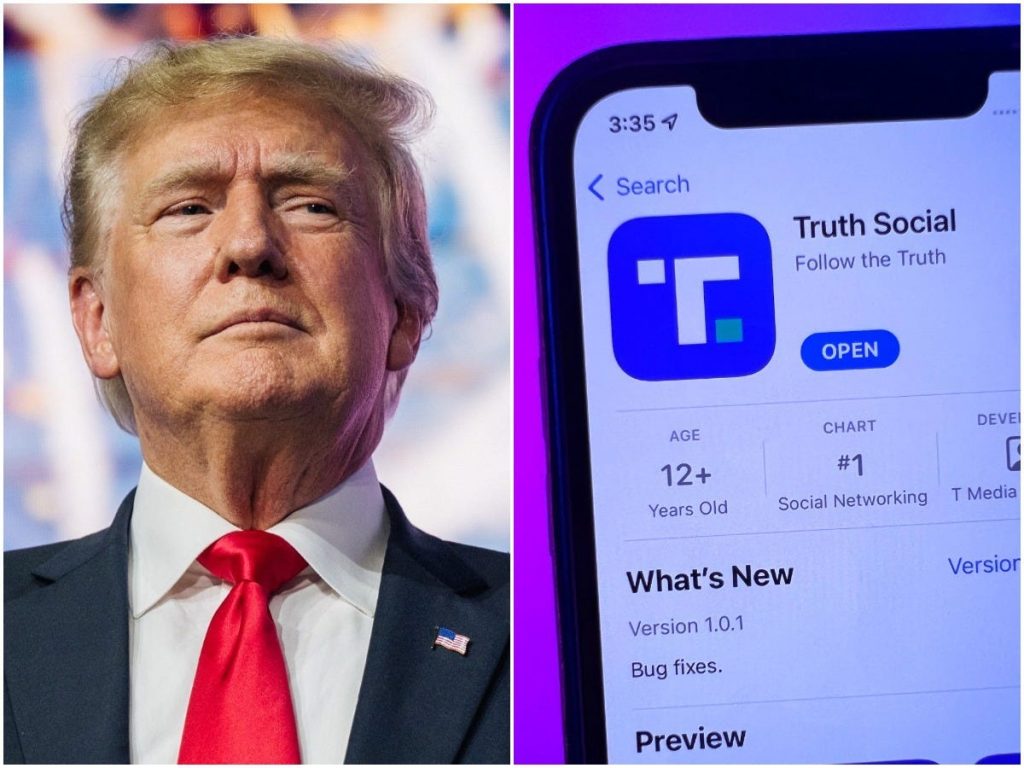- A new report found instances where Trump's TRUTH Social kept posts from being visible.
- The posts discussed abortion and the January 6 committee hearings, according to Public Citizen.
- The site has billed itself as a beacon of free speech.
Former President Donald Trump's social media company TRUTH Social has marketed itself as a "free speech haven" that cherishes "free expression."
But ever since its rocky start when it partially launched in February, its moderators have removed or limited the visibility of users' posts, often without explanation, according to a new investigation from the nonprofit, left-leaning consumer advocacy organization Public Citizen.
The removed or limited posts included content about the US House investigation of January 6, 2021, attacks on the Capitol as well as posts about abortion. It also blocked content by conservatives, the report says.
The author of the report, Cheyenne Hunt-Majer, told Insider that she started experimenting with posts on TRUTH Social after hearing that people were getting kicked off the platform for expressing anti-Trump or progressive sentiments.
"It became apparent for me within the first 15 minutes that things were being blocked," said Hunt-Majer, a Big Tech accountability fellow at Public Citizen who studies content moderation across social media companies.
As part of the experiment, Hunt-Majer wrote "abortion is healthcare" in a post and soon found it was being "shadow banned" — meaning that after it appeared to publish she couldn't find it anywhere on the website. She received no notice that the post was hidden or why.
Hunt-Majer posted a Tik Tok about the experience — which went viral — and the abortion post appeared five days later. She then approached her employer about writing a formal report about TRUTH Social, the findings of which published Tuesday.
The investigation she pursued revealed that TRUTH Social "shadow banned" a post she wrote comparing firearms regulations to abortion and birth control, as was a post she wrote about Georgia election worker Wandrea "Shaye" Moss, who testified at a House January 6 Committee hearing.
Blocked content wasn't limited to Democratic policy positions, the Public Citizen report found. For instance, a post about Blake Shelton in favor of gun ownership was getting "shadow banned," users found. The site also wouldn't allow a link to an article on Breitbart, a far-right website.
After users complained they couldn't post a quote criticizing US support for Ukraine, Hunt-Majer also tried to publish the quote but was unsuccessful.
TRUTH Social did not immediately respond to a list of questions from Insider about how it moderates content. Its website policies call "shadow banning" a "deceptive and manipulative practice" and promises the company "does not, and never will, shadow ban its users."
The company's website also says that it has to engage in some moderation to "prevent illegal and other prohibited content," and does so partially through artificial intelligence. Human moderators then review items that have been flagged or deleted, and users can get banned for threatening violence, posting porn, or infringing on intellectual property rights.
The company acknowledges the process "is not error-proof" and that it identifies and corrects any mistakes in removing posts.
But Hunt-Majer said the policies clash with the company's practice.
"They're taking a public stance on shadow banning and censorship, and then there is a reality of what is going on on the platform, which doesn't match up," Hunt-Majer said.
She wasn't able to get ahold of representatives at TRUTH Social, she said, but hypothesized that not all the shadow banning was nefarious — some was due to incompetence.
"You can tell from using the platform, just trying to get on, you can tell it's being strung together by a handful of people who are not capable of putting a social media site together," she said. "It's not user friendly."
TRUTH Social launched this year
A few conservative social media alternatives have emerged ever since Twitter and Facebook booted Trump from their platforms, saying he incited violence on January 6.
This year Trump has been using TRUTH Social largely to rant about the House January 6 Committee, to endorse Republicans in the 2022 primaries, and to mock President Joe Biden.
He counts 3.4 million followers — a fraction of the 88.7 million he had when he was on Twitter.
But his comments on TRUTH Social likely have a much further reach because journalists and Republicans often share the screen grabs of his comments on Twitter. Trump, who regularly hints that he'll run for the White house again in 2024, has said that he wouldn't return to Twitter even if allowed.
Social media companies often say they want to keep an open dialogue on their websites but soon run into the realities of what that means, said Hunt-Majer, calling content moderation a "difficult animal."
"People don't want to be on a platform where hate speech is rampant and you're getting bombarded with explicit images or lots of violence," she said.
TRUTH Social has prohibitions such as "offensive or sexual content," which includes language. It also bans depictions of "violence, threats of violence or criminal activity," and speech that is "false, inaccurate, or misleading."
Social media companies have faced backlash over censorship
Republicans often complain that Twitter blocks or suspends them more frequently than it does for Democrats, and accuse Twitter's employees of having an anti-conservative bias. Twitter employees have overwhelmingly donated to Democrats over Republicans, according to data compiled by the nonpartisan research organization OpenSecrets.
Twitter also censored the New York Post's reporting on emails from the laptop of Biden's son, Hunter Biden, ahead of the 2020 election. Biden's allies called the emails on the laptop "Russian disinformation," but the New York Times and Washington Post have since confirmed the emails were authentic.
Democrats, too, have seethed at social media giants, pushing them to be more strict about clamping down on falsehoods, hate speech, and language that incites violence.
Hunt-Majer said she also takes issue with how platforms such as Twitter and Facebook moderate content, saying that they have provisions about hate speech and incitement of violence but apply their rules inconsistently.
Those platforms, however, alert a user when their post is taken down and why, and provides an appeals process, Hunt-Majer said. Public Citizen's position in the report is that content moderation should be transparent, consistent, and carry some nuance.
Hunt-Majer's concern is that TRUTH Social users will think they're in a forum that welcomes diverse perspectives in an open forum, but will instead be in an "echo chamber" that will incite violence.
"It's a recipe for radicalism and extremism," she said.

